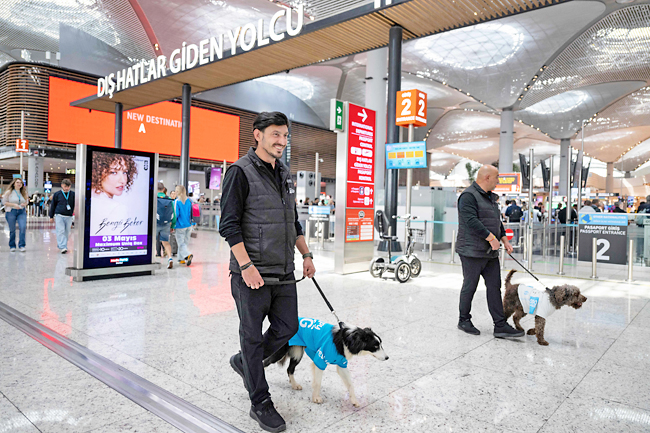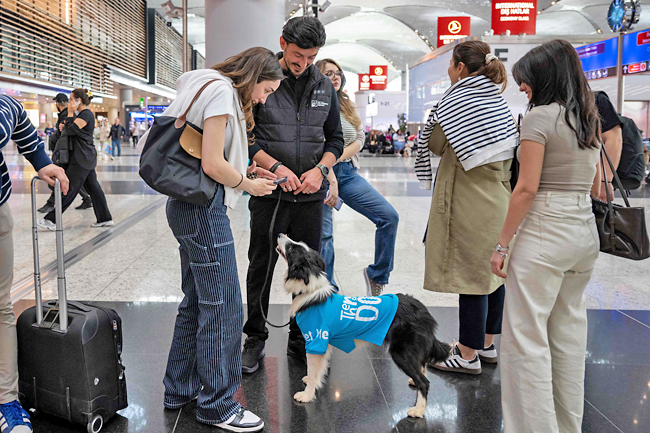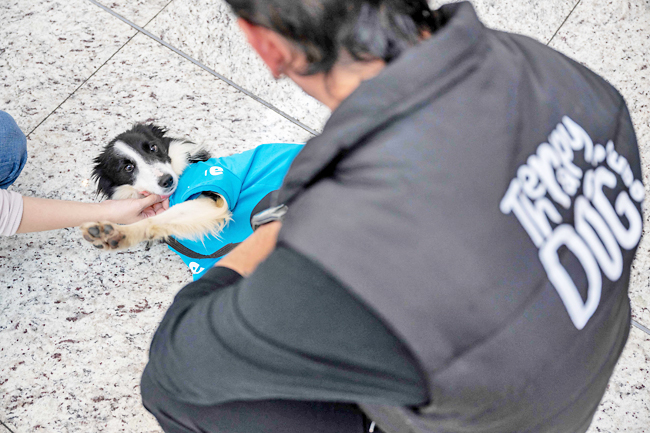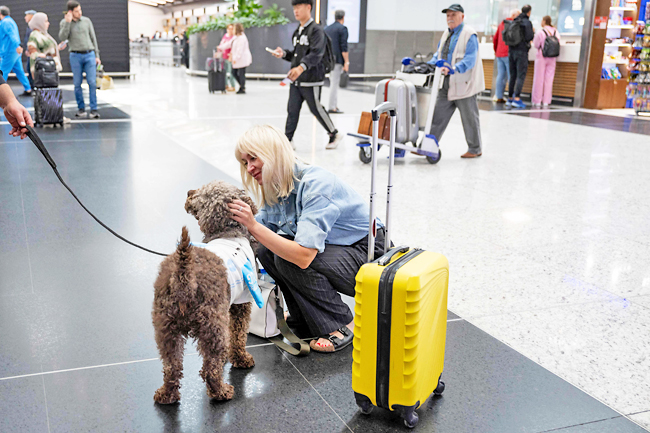ISTANBUL (AFP) – Six-year-old Kuki and one-and-a-half-year old Alita recently joined the staff of Istanbul Airport, one of the busiest in the world, with a mission to provide solace for stressed travellers.
At international departures just before passport control, the two dogs welcome passengers, some who are in a hurry, some feeling the tug of anxiety and some hanging around to say good-bye to loved ones.
Ali Bahtiyari, who was travelling outside his native Iran for the first time, was amazed as soon as he saw Kuki – a playful, dark brown Lagotto Romagnolo breed with thick curly fur, and Alita – a black and white Border Collie with expressive eyes.
“I’ve been in Istanbul for three to four days. I walked a lot. I was physically exhausted. But seeing these dogs here produced too much endorphin. I’m not tired at all,” the 31-year-old said, petting the two dogs before catching his flight back to Tehran.
“It’s a really good scene and it’s really nice to pet these dogs. I’m so happy that they are here.”
The two dogs – part of five-member team – and their handlers have for past two months been roaming certain spots, mingling with passengers awaiting flights at the mega airport, a global hub that served more than 76 million passengers last year.




“We implemented the therapy dog project to provide our guests with a better flight experience and to reduce any flight stress,” a vet who is coordinating the project, Volkan Arslan, told AFP.
Five dogs including Kuki and Alita went through serious training, roaming domestic and international terminals. Two more dogs will join them once done with their tutoring.
The dogs are the only canines permanently stationed at the airport, which only uses sniffer dogs when police are summoned by customs agents. They have been working for five days on rotation for a maximum three hours a day.
Their schedules depend on their breed.
“A Border Collie, Alita is very energetic, loves spending time with our guests, so we keep her schedule a little longer,” Arslan said.
“Kuki on the other hand wants to rest and is unwilling to put in too much effort, so we keep his schedule shorter.”
Kuki’s trainer Ismail Seyhan said schedules also change according to the dogs’ health and psychology. “The one who works today rests the next day,” he said.
While walking to the passport control in a rush, Fatima Bouzerda swiftly changes her direction having established an eye contact with Kuki, finding it hard to disguise her surprise.
“It’s the first time I see something like that. I heard about cat cafes, but like this in airports, I’ve never seen that,” she said while playing with Kuki.
Bouzerda, who lives in Paris, said in large airports like Istanbul travel could sometimes be stressful.
“So when we see something like this, it’s so cute and it makes us less stressed,” she said.
Customer experience manager at Istanbul Airport Abdulkadir Demirtas said the feedback from the guests were all positive.
“What pleases me the most is that children and families who are hesitant to approach the dog at first can interact with them within seconds,” he said.
“This is actually the moment that makes us very happy and is exactly what we want to see.”
Alita’s trainer Volkan Gul shared an anectode from one of the moments at the airport.
“One day we saw a passenger crying and then make eye contact with the dog, and I told her she can pet her. She was still in tears but after a while, she touched her and while leaving, she had a smile,” he said.
Dozens of airports in the United States have therapy dog programmes with the goal of providing comfort and relief for passengers dealing with anxieties of air travel.
Apart from airports, therapy or service dogs are also trained to interact with people in hospitals, libraries and schools.
Arslan said the new colleagues were already making difference at the bustling airport.
“That really motivates us. We have guests who not only have flight stress but also dog phobia. They take the first step in overcoming these phobia with us,” he said.


